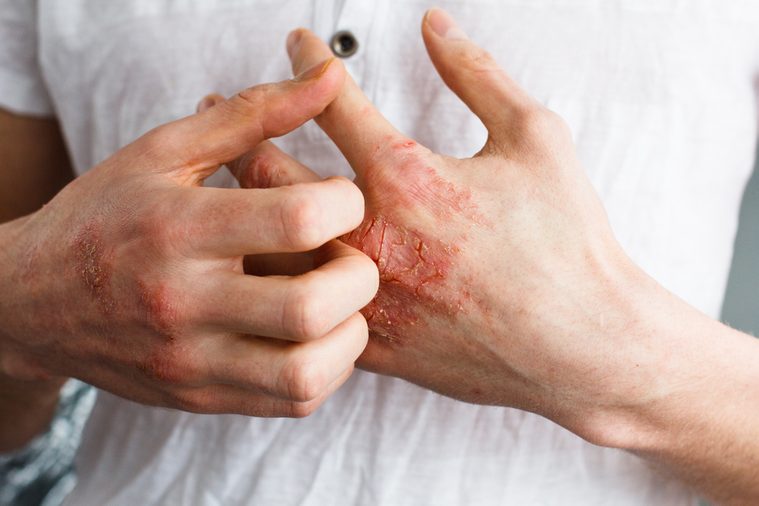
What is psoriasis?
Psoriasis is often thought of as a common skin problem, but it’s much more than that. It’s a chronic autoimmune disease that causes the rapid build-up of skin cells that leads to scaling on the skin’s surface and red, inflamed patches on the affected areas. According to the National Psoriasis Foundation, scientists still don’t know exactly what causes the disease, but it’s believed that the immune system and genetics play major roles. It can develop at any age, most commonly between the ages of 15 and 35, and it typically affects the outside of the elbows, knees or scalp, although it can appear anywhere on the body. It’s widely believed that men and women develop it at equal rates, but a recent study of 5,400 sufferers in Sweden found that the rate of severe psoriasis (covering more than 10 percent of the body) was significantly higher in men than in women. “In my experience men often present for care at later stages of the disease than women,” reveals board-certified dermatologist Rawn Bosley of Westlake Dermatology. “The early signs are often mild and overlooked by my male patients. In my experience, men tend to seek dermatological care when quality of life worsens due to their disease.” While home remedies cannot cure an autoimmune condition, these therapies can provide relief to stressed skin.
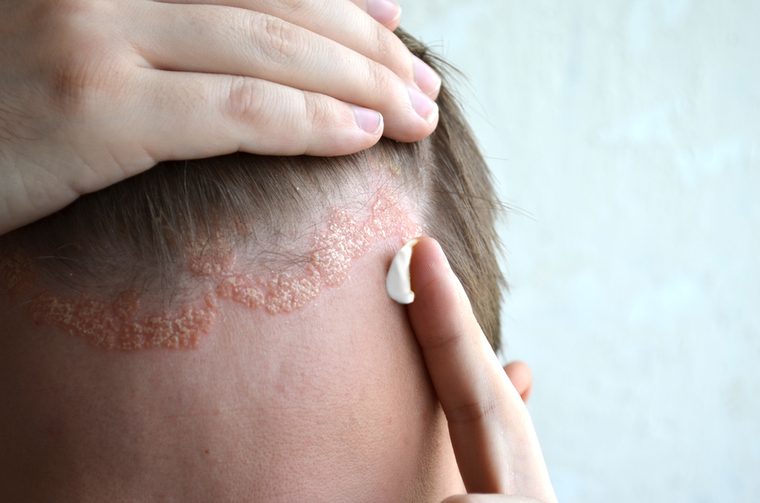
Types
While there are five types of the psoriasis, according to the National Psoriasis Foundation, the most common is plaque psoriasis, which is distinguished by dry, raised, red plaques (skin lesions) with silvery scales on the body. Other types of the condition can affect nails, scalp, or even joints, though the latter version, psoriatic arthritis, is the rarest type. Here are 10 things dermatologists wish you knew about scalp psoriasis.
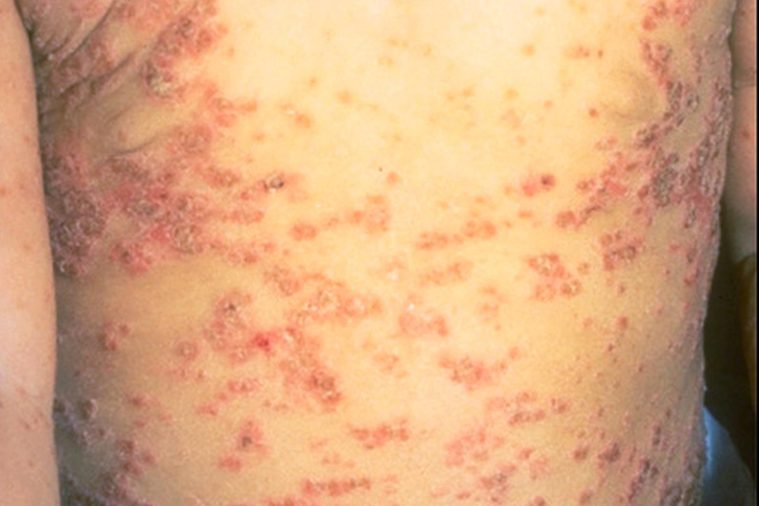
Symptoms
Psoriasis symptoms vary from person to person, but the most common are red patches of skin; small scaling spots; dry, cracked skin that may bleed; and thickened, pitted, or ridged nails, says Mayo Clinic. Some sufferers also report itching, burning or soreness, or swollen and stiff joints. Some people might only have a small patch of scaling, while in others major eruptions cover large areas of their body. One of the most frustrating aspects of this disease is that it is so unpredictable. While most types go through cycles, flaring for a few weeks or months, they don’t always follow a pattern. For example, here are 7 things dermatologists want you to know about guttate psoriasis. Some people live with the disease forever, while others go into complete remission. “This is a chronic disease with intermittent flares and relapses,” says board-certified dermatologist Tsippora Shainhouse. “It can be extremely well-controlled, but not cured.”
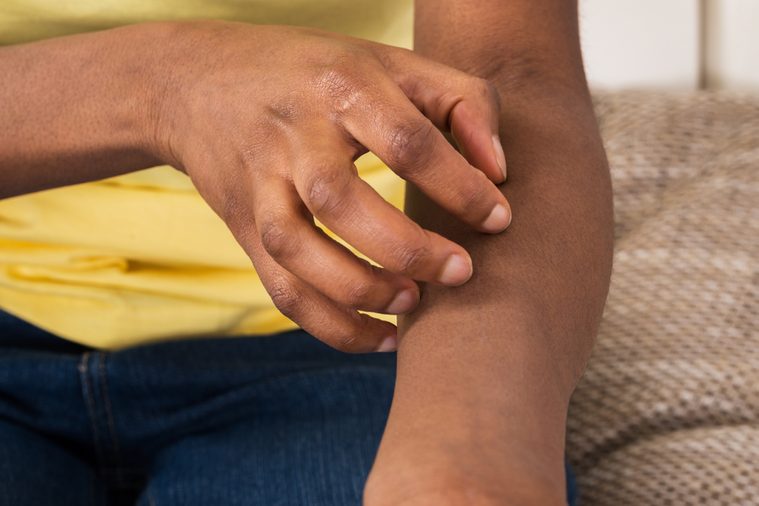
Triggers
Some foods may make psoriasis worse. Other possible triggers are stress, injury to the skin, infection, and certain medications. Some psoriasis can appear as a reaction to injury or trauma. This is known as the Koebner phenomenon orKoebner response. Possible triggers are vaccinations, sunburns, and scratches. Certain medications can aggravate psoriasis, such as lithium, some antimalarial drugs, the high blood pressure medication Inderal, and the heart medication Quinidine. Anything that can affect the immune system can be a trigger. In particular, streptococcus infection (strep throat), which has been linked to psoriasis. Some sufferers notice outbreaks in response to allergies and the weather, although there have been no studies.
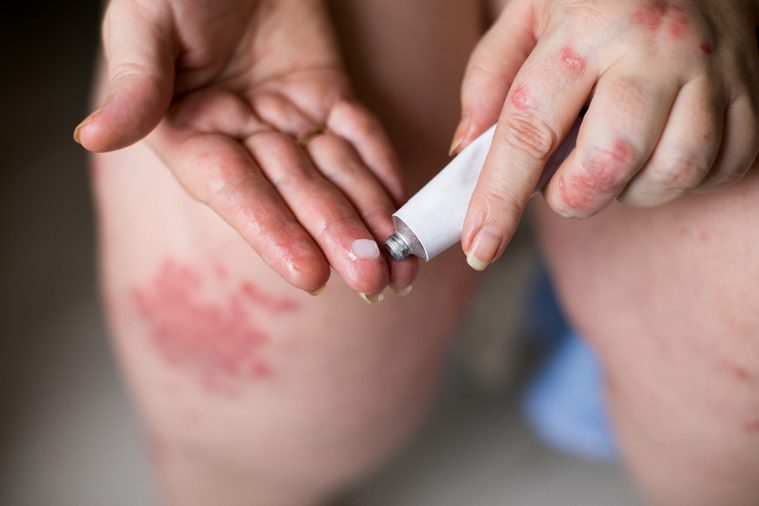
Topical treatments
Topical treatments, either over the counter or by prescription, are normally the first treatment following diagnosis. These treatments, when applied to the skin, help to slow down or normalize excessive cell reproduction and reduce inflammation. According to the National Psoriasis Foundation, the most frequently prescribed topical treatment are corticosteroids, commonly known as steroids. They reduce the swelling and redness of lesions. Steroids come in various strengths, ranging from very strong or “superpotent” (Class 1) to very weak or “least potent” (Class 7). The stronger the steroid, the more effective it is in treating the symptoms, but the risk of side effects is greater. Potential side effects of topical steroids include thinning of the skin, pigmentation changes, stretch marks, redness and dilated surface blood vessels. When applied to widespread areas of the skin or used over long periods of time, steroids can be absorbed through the skin and affect internal organs. It’s important to follow your doctor’s advice when applying steroids, and the National Psoriasis Foundation advises against using steroids for more than three weeks without seeking further medical advice. Over the counter topicals typically contain salicylic acid and coal tar, both FDA-approved for treatment. Aloe vera, jojoba, zinc pyrithione, or capsaicin may be added for their moisturizing, soothing, and itch-relieving properties. If topical treatments don’t alleviate symptoms, oral treatments, systemics, or phototherapy may be considered.

Alternative remedies
Complementary and alternative remedies focusing on preventive care and pain management include dietary changes, herbs and supplements, mind/body therapies such as aromatherapy, yoga and meditation, physical therapies, exercise and the ancient arts of acupuncture and tai chi. Some sufferers enlist the help of a naturopathic physician to figure out what alternative remedies might work for them. While much of the evidence supporting alternative therapies is anecdotal, most of them are considered to be safe. However, always tell your doctor what remedies you are trying, particularly if you are also being prescribed treatment. Here are 50 popular natural remedies, including one for psoriasis.

Lifestyle changes
Living with psoriasis can be stressful, and stress can be a trigger, so make self-care a priority. Small changes to everyday routine can help manage symptoms. Keep your skin well lubricated, as it reduces redness and itching and helps the skin to heal. Lock in water by applying a heavy cream or ointment to affected areas daily, after every shower, and to hands after every wash. Avoid hot baths, which aggravate the skin; take lukewarm showers of 10 minutes or less instead. If you do take a bath, keep the water lukewarm and try adding oil, oilated oatmeal, Epsom salts, or Dead Sea salts to help remove scale and relieve itching. As soon as you get out of the a bath or shower, apply cream or ointment—fragrance-free is best, to avoid skin irritation. Also, eliminate toxins. “Don’t smoke and minimize alcohol consumption, both of which can lead to flares,” explains Shainhouse. “Exercise and maintain a healthy body weight, as being overweight is also associated with skin disease.”